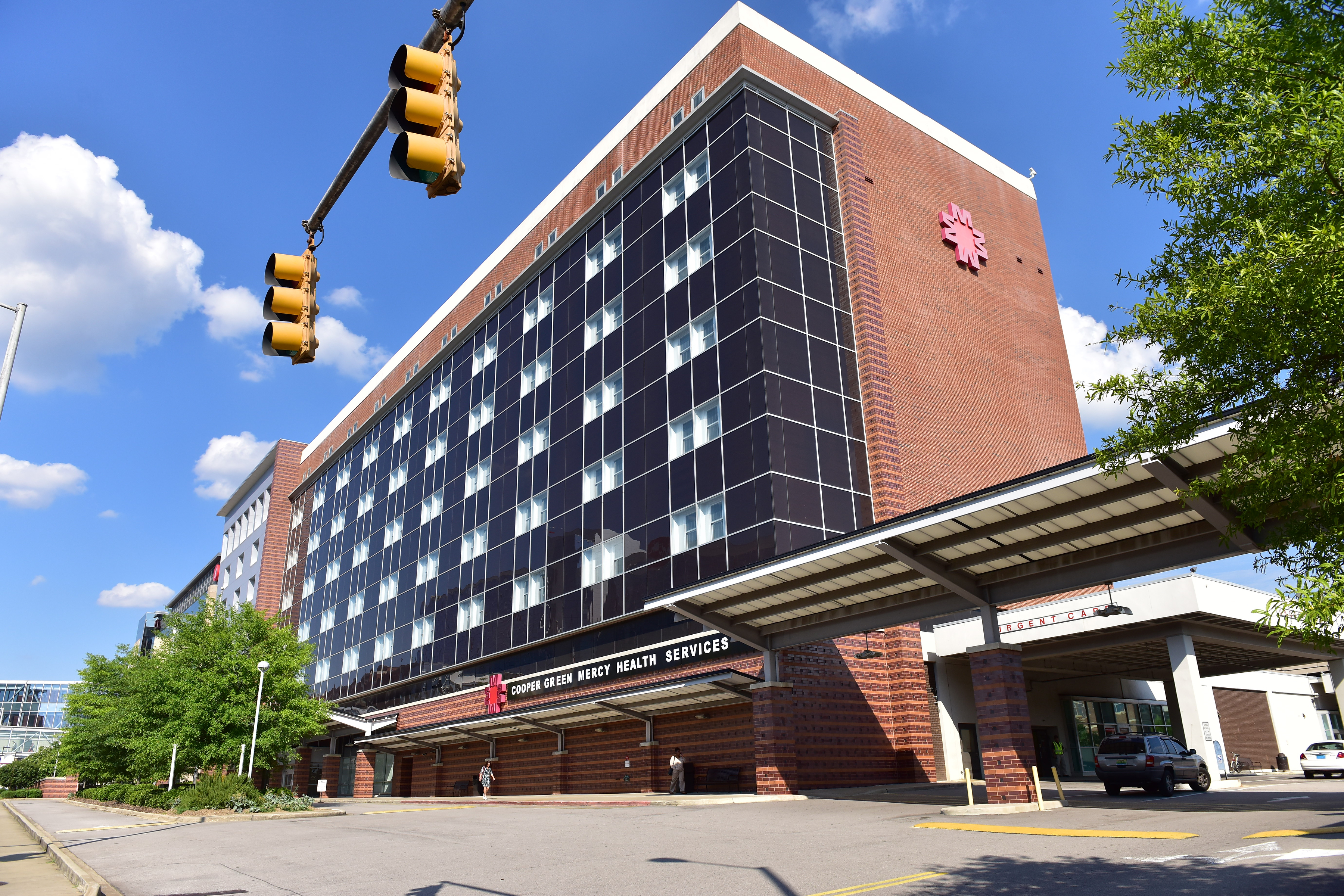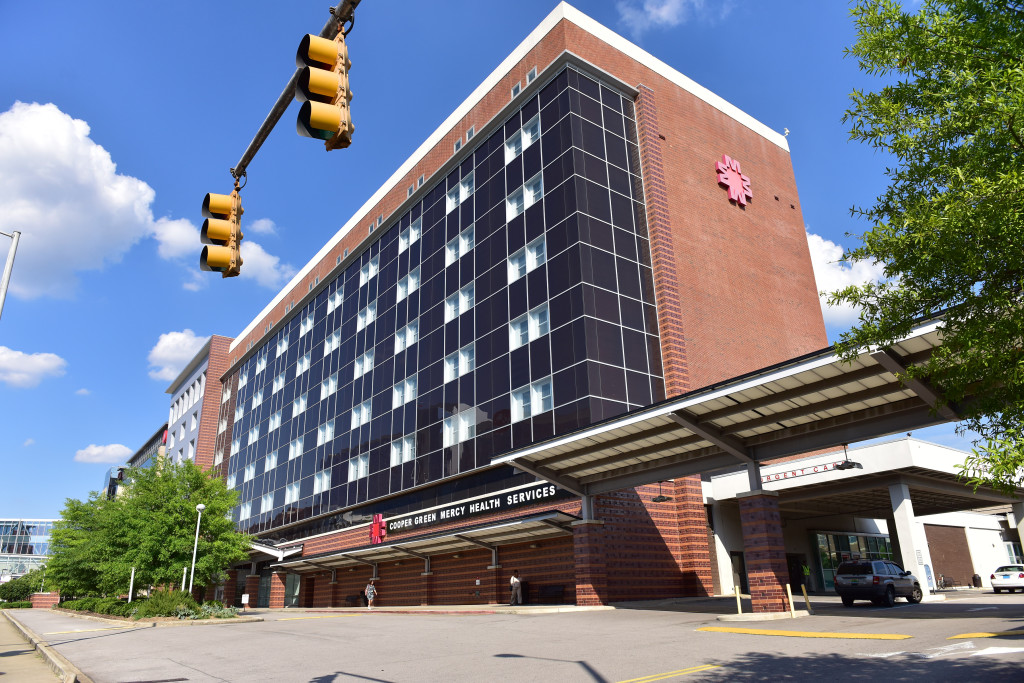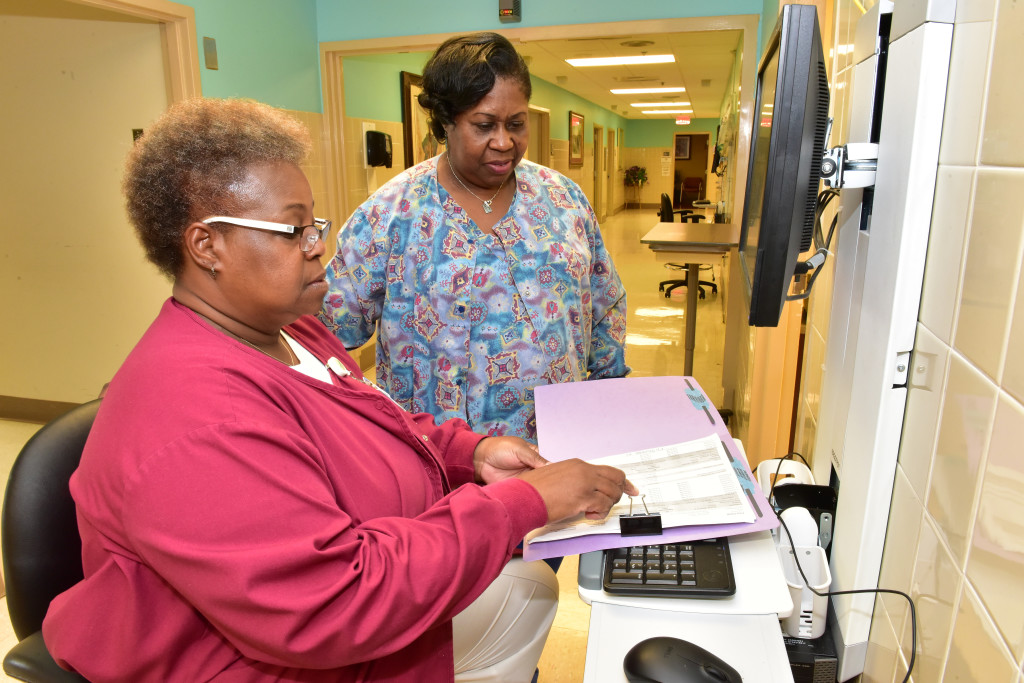
By Eboné Parks
The Birmingham Times

Count Tony Petelos among those who have an affinity for Cooper Green Mercy Health Services. The chief executive officer of Jefferson County was at the Sixth Avenue South facility one day several years ago when he wasn’t feeling well.
“I was there for a meeting, and I wasn’t feeling right,” Petelos recalled. “I went to the urgent care, and the doctor said, ‘You need to go see your urologist.’ I went to see my doctor, and he diagnosed me with bladder cancer. I’m not afraid to go to Cooper Green. It’s a well-run organization,” said Petelos, who has made a full recovery.
He’s not the only person pleased with facility. Stories like Petelos’s have been repeated by a number of patients, including Maralyn Mosley, a longtime patient who had been a vocal and frequent critic of the Jefferson County Commission’s decision to downsize Cooper Green Mercy Hospital.
“I think we are moving in the right direction,” Mosley said. “Cooper Green has added new, much-needed services to its clinics. And it seems that the patient count, the census, is picking up. People are coming back.”
Mosley said she is encouraged to see that the clinic now provides podiatric, geriatric, and orthopedic services, as well as several new internists.
Once a 319-bed inpatient hospital, Cooper Green Mercy transitioned to a medical-service clinic after a majority of the Jefferson County Commission voted to close the inpatient care unit and emergency room in August 2012. On Jan. 1, 2013, Cooper Green Hospital closed and began operating as an urgent care center with primary clinics.
Closing the inpatient care unit and emergency room was painful, but it was the right thing to do, said Roger McCullough, chief executive officer of Cooper Green.
“When you come to Cooper Green, you not only get comprehensive health care, but you truly get world-class health care,” he said. “I can’t imagine why people go anywhere else. We’re doing everything.”
Jefferson County Commission President Jimmie Stephens, who was among the majority on the commission that voted for the downsizing, said he has been pleased by the turnaround.
“The key has been sound management practices with a focus on improving patient care,” he said. “The key is enhancing patient care, and coupling that with the desire and ability to improve each individual’s quality of life.”
Starting Over
Along with Stephens, commissioners David Carrington and Joe Knight voted to downsize the hospital; commissioners Sandra Little Brown and George Bowman voted against the move.
Then known as Mercy Hospital, Cooper Green opened in October 1972. The Alabama state legislature in 1965 designated a portion of sales and liquor taxes collected in Jefferson County for indigent care. Those funds were used to build and operate the hospital and provide medical care for county residents who were unable to pay.
The social and cultural significance of Cooper Green made the county-owned facility one of the most sensitive issues for elected state and local officials. The decision to make changes caused tumult across the metro area and led to protests by community activists and some local politicians.
In 2013, Cooper Green Mercy Health Services (CGMHS) began operating as a full-service ambulatory care facility that includes both primary and specialty care, as well as urgent care, laboratory services, radiology, a pharmacy, and other services—all in a single location. In addition, there is an onsite pharmacy, a podiatrist, and an eye clinic.
“The only services we don’t provide are transplants,” McCullough said. “Any other medical services anyone needs, they have it when they walk in the door.”
Cooper Green is “one of few indigent facilities that are affiliated with a world-class academic medical center,” he added. “If the very poorest person in Jefferson County walks through the door, they have access to full range of comprehensive services.”
Cooper Green has a partnership with the University of Alabama at Birmingham (UAB) that is second to none, McCullough said.
“Through our partnership with UAB, we try to manage the best, high-quality primary care to keep patients from needing the more expensive specialties,” he said.
According to McCullough, 65 percent of the clinic’s population is considered indigent; the other 35 percent have Medicare, Medicaid, Blue Cross Blue Shield, or other insurance coverage. Currently, 15 primary care providers and 30 specialists work with CGMHS, mainly on a part-time basis.
The Transition
When the hospital was downsized, many doctors left and the facility faced a number of challenges, McCullough said.
“It wasn’t just doctors who left. Patients left, too,” he said. “Probably the hardest thing we had to deal with was trying to convince the public that Cooper Green was still open.”
And there were other problems.
“We lost our capacity to see patients, which resulted in very long wait times,” he said. “That never bodes well, particularly with [indigent patients], because there really is a more chronically ill population, so they really need quicker access to services.”
The wait time for some patients had been as long as 17 weeks in some instances. That’s down to six weeks or less, say hospital officials. If a patient has an acute situation, they are seen in less than six weeks.
Mosley said she doesn’t have to wait long to see her doctor now.
“For a long time it was tough, but it has gotten better,” she said. “You had such a long wait between appointments. It’s much better now because there are more doctors on staff.”

Looking Forward
Cooper Green has about 62,000 patient visits a year, approximately 200 to 250 patients on a daily basis. The facility has added a number of new medical specialties, and the number of primary care providers has increased—along with the number of patients.
“Probably the most difficult thing to manage now is the increase in the volume of patients. In the last two months, we’ve had 1,000 new patients,” McCullough said.
Still, however, some officials have concerns.
“Even though the quality of health care is much better and less costly than it was when the hospital was open, the current facility is inefficient, outdated, and in need of major capital infusions,” said Commissioner Carrington.
McCullough said hospital officials are investing in the facility.
They have ordered radiology equipment, including state-of-the-art CT scanners, digital mammography, and ultrasounds, he said. And they are in the process of buying new chemotherapy chairs for the oncology unit. Several million dollars are being spent on the latest equipment.
Before the transition, the hospital hadn’t made an investment in its equipment infrastructure in more than two decades, McCullough said. Now, there has even been talk about building an entirely new clinic on the site of the parking deck next to Cooper Green on Sixth Avenue.
High Expectations
Stephens said the commission will make whatever investments are needed to provide top-notch care.
“Our goal is to offer each person in Jefferson County world-class health care,” he said. “This was the original mission of Cooper Green, and we pledge to continue the effort to return to that mission and improve the quality of life for its patients. It is our duty and responsibility. Our citizens should expect no less.”




